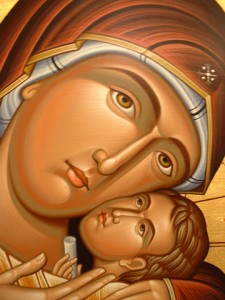 from Orthodoxwiki.org
from Orthodoxwiki.org
Though the Orthodox Church does not follow the teachings of the Protestant Reformers, their views regarding the Theotokos’s ever-virginity are a point of commonality with Orthodoxy. Many of the major figures amongst the Protestant fathers in the faith believed in the Theotokos’s ever-virginity.
John Calvin:
-
He says that she [Mary of Cleophas] was the sister of the mother of Jesus, and, in saying so, he adopts the phraseology of the Hebrew language, which includes cousins, and other relatives, under the term ‘brothers.’ – John Calvin, Commentary of the Gospel According to John, on John 19:25
-
The word ‘brothers’, we have formerly mentioned, is employed, agreeably to the Hebrew idiom, to denote any relative whatever; and, accordingly, Helvidius displayed excessive ignorance in concluding that Mary must have had many sons because Christ’s ‘brother’ are sometimes mentioned. – John Calvin, Commentary on a Harmony of the Evangelists, Matthew, Mark, and Luke, vol. II, p. 215 (on Matthew 13:55)
[Note: Helvidius was a 5th-century Christian who denied the perpetual virginity of Mary and was rebuked and refuted by Jerome in his treatise, “On the Perpetual Virginity of Blessed Mary Against Helvidius“]
Huldrych Zwingli:
-
I give an example: taught by the light of faith the Christ was born of a virgin, we know that it is so, that we have no doubt that those who have been unambiguously in error have tried to make a figure of speech of a real virgin, and we pronounce absurd the things that Helvidius and others have invented about perpetual virginity. – Huldrych Zwingli. “Friendly Exegesis, that is, Exposition of the Matter of the Eucharist to Martin Luther, February 1527,” in Selected Writings of Huldrych Zwingli, Volume Two, trans. and ed. by H. Wayne Pipkin, Pickwick Publications, 1984 p.275.
-
Then the pious mind finds wonderful delights in searching for the reasons why the lamb chose to be born of a perpetual virgin, but in this other case it finds nothing but a hopeless horror. [The other case that Zwingli here refers to is the Real Presence] – Huldrych Zwingli. “Subsidiary Essay on the Eucharist, August 1525,” in Selected Writings of Huldrych Zwingli, Volume Two, trans. and ed. by H. Wayne Pipkin, Pickwick Publications, 1984 p.217.
Martin Luther:
-
A new lie about me is being circulated. I am supposed to have preached and written that Mary, the mother of God, was not a virgin either before or after the birth of Christ, but that she conceived Christ through Joseph and had more children after that. – Martin Luther, “That Jesus Christ Was Born a Jew,” in Luther’s Works, vol. 45, ed. Walther I. Brand, 1962, Muhlenberg Press, p. 199.
-
The form of expression used by Matthew is the common idiom, as if I were to say, ‘Pharaoh believed not Moses, until he was drowned in the Red Sea.’ Here it does not follow that Pharaoh believed later, after he had drowned; on the contrary, it means that he never did believe. Similarly when Matthew says that Joseph did not know Mary carnally until she had brought forth her son, it does not follow that he knew her subsequently; on the contrary, it means that he never did know her. Again, the Red Sea overwhelmed Pharaoh before he got across. Here too, it does not follow that Pharaoh got across later, after the Red Sea had overwhelmed him, but rather that he did not get across at all. In like manner, when Matthew says, ‘She was found to be with child before they came together,’ it does not follow that Mary subsequently lay with Joseph, but rather that she did not lie with him. – Martin Luther, “That Jesus Christ Was Born a Jew,” in Luther’s Works, vol. 45, ed. Walther I. Brand, 1962, Muhlenberg Press, p. 212.
John Wesley:
-
I believe that he was made man, joining the human nature with the divine in one person; being conceived by the singular operation of the Holy Ghost, and born of the blessed Virgin Mary, who, as well after as before she brought him forth, continued a pure and unspotted virgin. – John Wesley “Letter to a Roman Catholic”
Protestants who deny the ever-virginity of the Theotokos are breaking even with their own fathers in faith.
